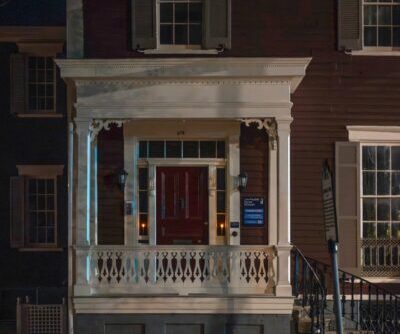Ethical Issues at Haunted Civil War Sites
 As a historian who studies the Civil War’s hospitals and prisons in my town of Alexandria, Virginia, I often speak with people who find the topics a bit taboo. They either become a bit uncomfortable learning their neighborhood once housed centers of disease and devastation, or it fuels judgmental comments on “how I could go there” – knowing how haunted it is.
As a historian who studies the Civil War’s hospitals and prisons in my town of Alexandria, Virginia, I often speak with people who find the topics a bit taboo. They either become a bit uncomfortable learning their neighborhood once housed centers of disease and devastation, or it fuels judgmental comments on “how I could go there” – knowing how haunted it is.

My tours provide a historical account of the confiscation and conditions of each requisitioned site. Promotion of the paranormal happenings and the promise of a ghost sighting are forms of commercialization at these “spooky” and morbid places, often leading to over-sensationalized events. Ethically-speaking, where is the line between entertainment and education when emphasizing the darker aspects of a historic site?
At Alexandria’s Lee-Fendall House, we offer both historical tours and seasonal events surrounding the museum’s time as a Union Army hospital. Our upcoming haunted hospital experience, “Screams and Disease,” transports the attendees back to 1863. Staff and volunteers become nurses, surgeons, and patients – running through the halls or languishing on the floor. It is all in good fun, but the dramatics are based in reality, off actual stories of those who were treated and died there. The “jump-scares” are genuine, since Lee-Fendall is already quite spooky at night, and we have no reason to do more than portray a true Civil War hospital.
Some historical sites can exaggerate their haunted history, and the tone becomes disrespectful. Added horror themes, like chainsaws and movie references, misuse the real events that took place. Luckily, these exaggerations mainly occur at abandoned facilities-turned Halloween attractions. But as Civil War historians and stewards of these impactful places, it is still our duty to monitor how we discuss the darker history of sites and protect it from commercial exploitation.
Biography
Madeline Feierstein is an Alexandria, VA historian specializing in psychiatric institutions, hospitals, and prisons. A native of Washington, D.C., her work has been showcased across the Capital Region. Madeline leads efforts to document the sick, injured, and imprisoned soldiers that passed through Civil War Alexandria. Additionally, she supports the National Museum of Civil War Medicine and interprets the burials in Alexandria’s historically rich cemeteries with Gravestone Stories. Madeline holds a Bachelor of Science in Criminology from George Mason University and a Master’s in American History from Southern New Hampshire University. Explore her research at www.madelinefeierstein.com.
Great topic! “Dark tourism” has become big business, and some Civil War sites, like Graffiti House, have fully embraced that as a way to bring money and attention. If leveraged properly, it can be a great benefit. But that always has to be balanced with the fact that many people do not consider that stuff “serious” and you may end up turning off a certain percentage of the public.
I have visited Graffiti House and it was worth the visit. The writing on those walls offer insight to the thoughts and feelings of the men who spent time there. This may sound a bit stuffy/harsh , but I would prefer that organizations not prostitute themselves for the sake of commercialization. Embracing tourism by promoting dark tourism such as paranormal activity or spooky tours should not be the way to increase visitation and support iconic sights. It is disheartening regarding the degree that individuals or organizations will compromise their integrity. Sadly there will always be grifters. Civil War sites should be treated with the sacredness and respect they so rightly deserve.